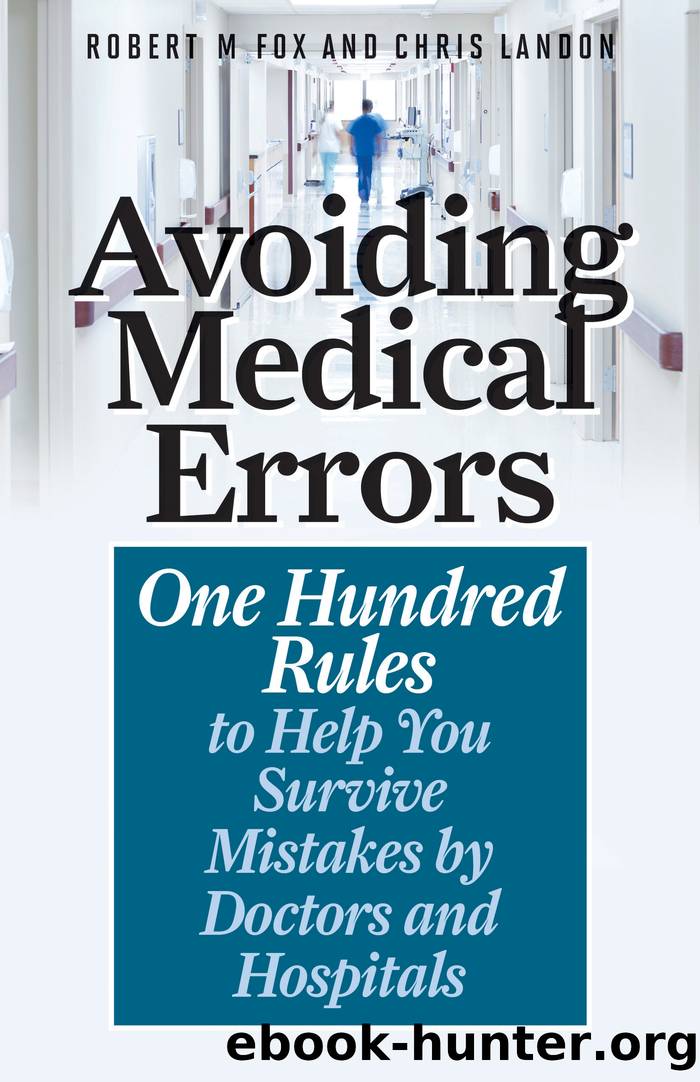Avoiding Medical Errors by Robert M. Fox

Author:Robert M. Fox
Language: eng
Format: epub
Tags: undefined
Publisher: Rowman & Littlefield Publishers
Published: 2012-07-15T00:00:00+00:00
Here are the two exceptions we want you to understand and handle. They involve your consent to surgery and credit card authorization. These two documents may be buried in your pile of other documents. Watch for them! We will discuss each separately:
Exception 1: The Surgical Consent (See Appendix C)
Look for the surgical consent. It may say “Consent to Surgery” or different words may be used. It gives the surgeon the right to operate on you. If you can’t easily find it, ask someone at the hospital—either in person or by telephone—“Please tell me, where in your forms is the Consent to Surgery?” You must find it. When you do, alter it so that you are giving the right to do surgery only to your surgeon. Do not ask for “permission” to change the form. Quietly, and without saying anything to the hospital intake personnel, draw a line through the printed material that would allow your surgery to be performed by someone else. To help you understand this rule, we have included a sample consent showing our suggested alteration in Appendix C.
You need not be a lawyer to understand this rule. Just make sure that your surgical consent is corrected before you sign it, so that it gives the right to do surgery to your doctor and no one else. If you are not sure how to alter the form, or if you are otherwise confused, print the following words just above your signature: “I grant only Dr. [name of your doctor] permission to do this surgery.”
Also, don’t forget that there are various backup rules mentioned elsewhere in our book that require that you also have several personal discussions with your surgeon, during which the surgeon agrees that he or she will personally perform the surgery. If there is some question, you might mention you have heard that, particularly at major hospitals, the actual surgery is performed by residents, interns, or fellows to train them, and while you certainly think this is a good idea, “I do not want this to happen at my surgery.”
We realize we have suggested you have this discussion with your surgeon several times, but our repetition is intentional. Memories—even for skillful surgeons—can be short, particularly in the hectic times leading up to the surgery itself. Therefore, better to be safe, not sorry!
Finally, do not worry if you do not find and alter the surgical permission document. Per these rules, you will be reminding your surgeon several different times of his obligation—and agreement—to personally perform the surgery.
Download
This site does not store any files on its server. We only index and link to content provided by other sites. Please contact the content providers to delete copyright contents if any and email us, we'll remove relevant links or contents immediately.
When Breath Becomes Air by Paul Kalanithi(7264)
Why We Sleep: Unlocking the Power of Sleep and Dreams by Matthew Walker(5644)
Paper Towns by Green John(4169)
The Immortal Life of Henrietta Lacks by Rebecca Skloot(3826)
The Sports Rules Book by Human Kinetics(3589)
Dynamic Alignment Through Imagery by Eric Franklin(3489)
ACSM's Complete Guide to Fitness & Health by ACSM(3469)
Kaplan MCAT Organic Chemistry Review: Created for MCAT 2015 (Kaplan Test Prep) by Kaplan(3423)
Introduction to Kinesiology by Shirl J. Hoffman(3301)
Livewired by David Eagleman(3123)
The River of Consciousness by Oliver Sacks(2992)
Alchemy and Alchemists by C. J. S. Thompson(2912)
The Death of the Heart by Elizabeth Bowen(2902)
Descartes' Error by Antonio Damasio(2733)
Bad Pharma by Ben Goldacre(2730)
Kaplan MCAT Behavioral Sciences Review: Created for MCAT 2015 (Kaplan Test Prep) by Kaplan(2492)
The Gene: An Intimate History by Siddhartha Mukherjee(2492)
The Fate of Rome: Climate, Disease, and the End of an Empire (The Princeton History of the Ancient World) by Kyle Harper(2436)
The Emperor of All Maladies: A Biography of Cancer by Siddhartha Mukherjee(2431)
